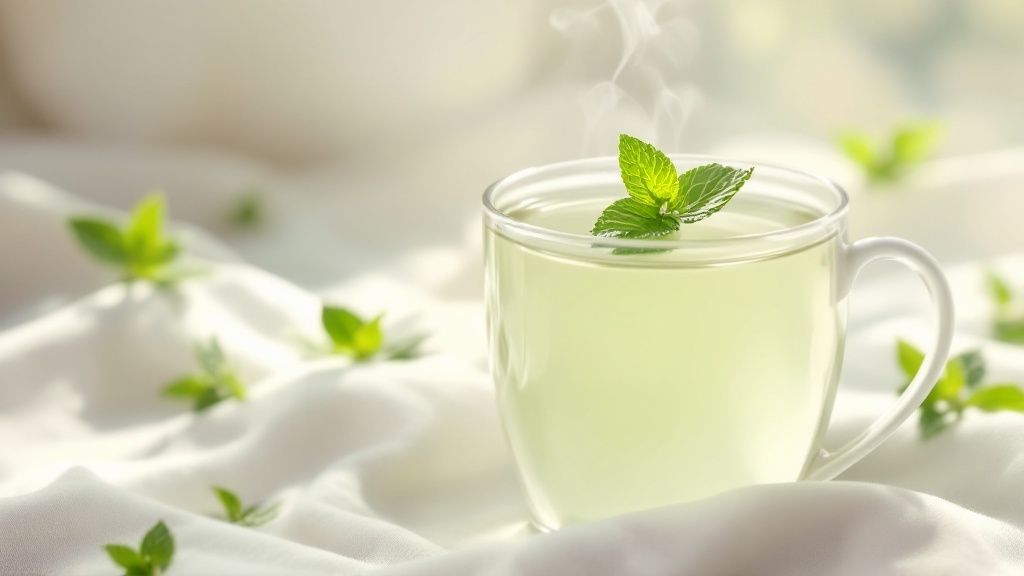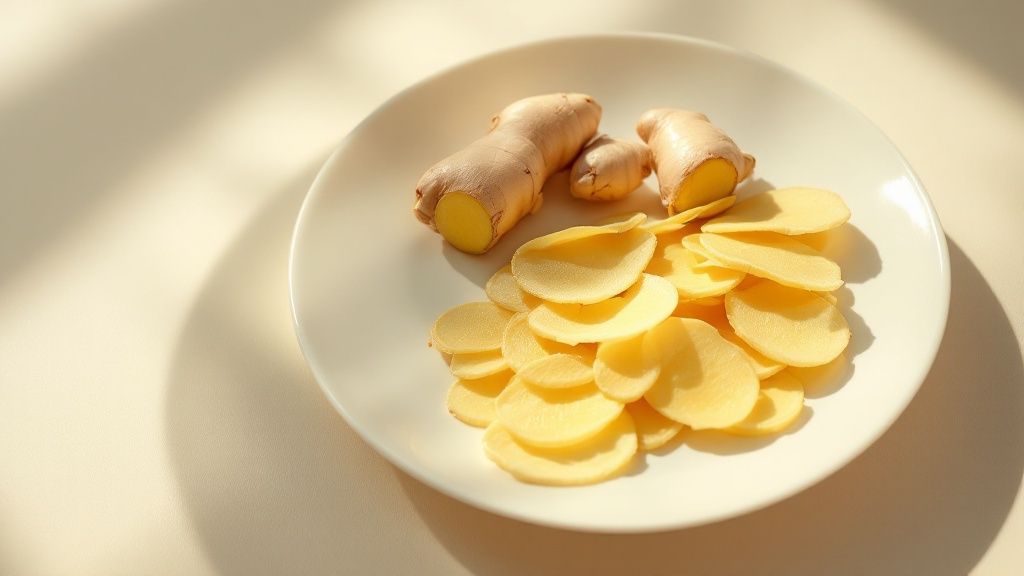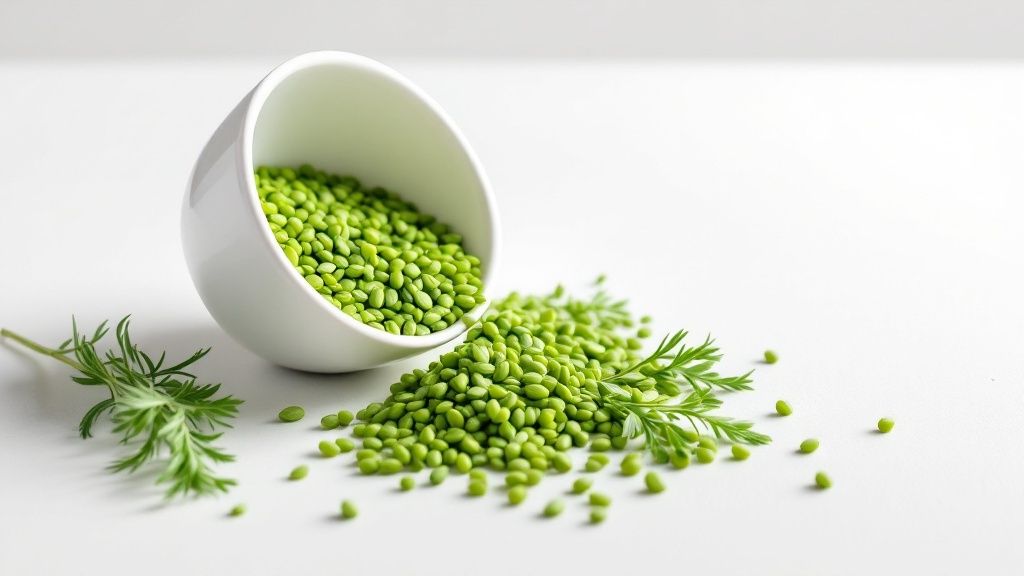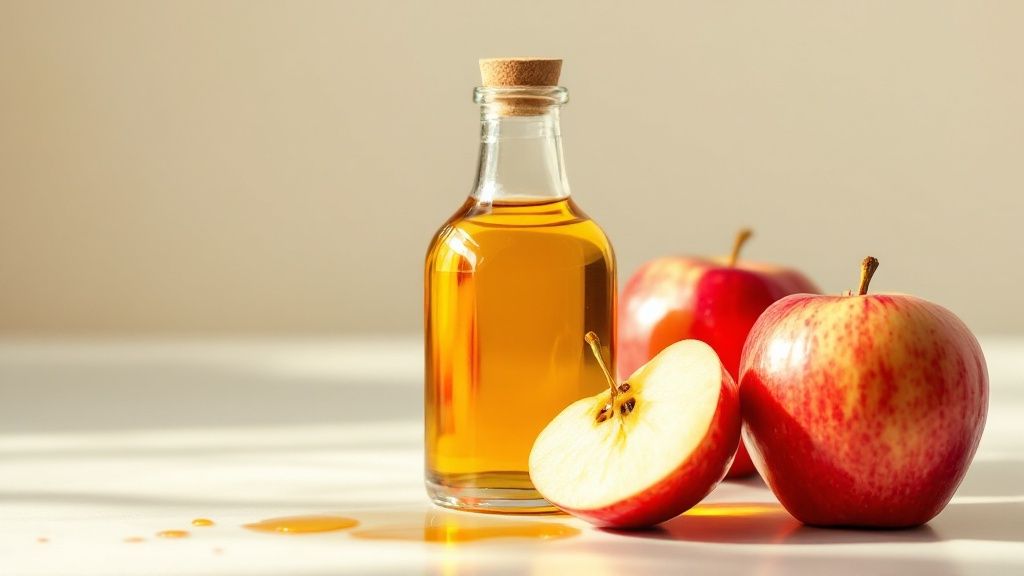8 Natural Remedies for Bloating: Your 2025 Guide to Relief
Ever feel like your stomach inflates like a balloon by mid-afternoon? You’re not alone- and we get how frustrating that is. It's not always about what you ate for lunch. That uncomfortable, tight feeling can derail your day, leaving you feeling sluggish and just plain off. I've been there, and I know how disheartening it is when your body feels like it's working against you.
But what if you could fight back with simple, effective tools? This guide is our promise to you. We're not offering vague advice or impossible diets. Instead, we'll walk you through a list of powerful, science-backed natural remedies for bloating designed to bring you real relief. We're talking tangible solutions you can start using today, from soothing teas to digestive aids that help your system run smoothly.
Let's explore everything from the calming power of peppermint and ginger to the gut-balancing benefits of probiotics and digestive enzymes. You'll learn not just what to use, but how and why these remedies work to reduce gas and support long-term digestive wellness. This is your actionable roadmap to feeling lighter, more comfortable, and in control of your gut health. Let's dive in together.
1. Peppermint Tea: The Soothing Muscle Relaxer for Your Gut
When your stomach feels tight and full, a warm cup of peppermint tea is one of the oldest and most effective natural remedies for bloating. It’s more than just a comforting ritual; this powerful herb contains active compounds that directly target digestive distress. The magic ingredient is menthol, which has a remarkable ability to calm the muscles of your digestive tract.

Here's how it works in plain English: when you're bloated, your gut muscles can contract and spasm, trapping gas and causing that painful, pressurized feeling. Menthol acts as a natural antispasmodic, encouraging these muscles to relax. This allows trapped gas to pass more easily and alleviates the cramping and discomfort. It’s a gentle way to tell your over-active gut to calm down.
How to Use Peppermint Tea for Bloating Relief
Making peppermint tea a regular part of your routine is simple and incredibly effective.
- Best Time to Drink: Enjoy a cup after a large meal to aid digestion or when you feel the first signs of discomfort.
- Proper Steeping: To get the full benefits, steep your tea bag or fresh leaves in hot water for at least 5-10 minutes. This is crucial for extracting the highest concentration of menthol.
- Enhance the Effects: For an extra layer of calm, try a blend of peppermint and chamomile to further soothe an irritated digestive system.
A Quick Note: While peppermint tea is fantastic for most, it can sometimes relax the sphincter between the esophagus and stomach. If you suffer from acid reflux (GERD), this could potentially worsen symptoms. It’s always best to listen to your body. I do NOT think this is the best option for those with severe reflux.
2. Ginger: The Gastric Accelerator for Quick Relief
When bloating is caused by sluggish digestion, ginger acts like a catalyst to get things moving. This spicy root has been a cornerstone of traditional medicine for thousands of years, and modern science confirms why it's one of the best natural remedies for bloating. Its active compounds, gingerols and shogaols, work to speed up how quickly your stomach empties.

Basically, ginger encourages your stomach to pass food into the small intestine more quickly. This is key because when food lingers too long, it ferments and produces gas- leading directly to that uncomfortable, inflated feeling. By stimulating your digestion, ginger ensures food moves along efficiently, preventing the gut traffic jam that causes bloating.
How to Use Ginger for Bloating Relief
Incorporating ginger into your daily life can be a game-changer for your digestive comfort.
- Optimal Timing: The best time to have ginger is with or just before your meals. This helps your digestive system prepare for the food it’s about to receive.
- Effective Preparation: For fresh ginger tea, thinly slice a one-inch piece of ginger root and steep it in hot water for 10-15 minutes. Covering the mug while it steeps helps trap the beneficial oils.
- Daily Dosage: Aim for 1 to 1.5 grams of ginger daily. This could be a couple of cups of strong tea or a small amount of grated ginger in a smoothie.
A Quick Note: Ginger is potent and has a warming effect. Start with a smaller amount to see how your body responds. While it’s safe for most, those on blood-thinning medication should consult their doctor.
3. Fennel Seeds: The Aromatic Gas-Expelling Powerhouse
Ever wondered about that small bowl of candy-coated seeds at an Indian restaurant? You’ve encountered one of the most ancient natural remedies for bloating. Fennel seeds are tiny but mighty, acting as a powerful carminative-a substance that helps expel gas. Their secret weapon is anethole, an aromatic compound that relaxes the smooth muscles in your gut.

When your intestinal muscles are tense, they trap pockets of gas, leading to cramping and pressure. The anethole in fennel seeds encourages these muscles to unwind, allowing gas to move along and be released. This provides almost immediate relief and prevents that post-meal balloon feeling. Think of it as a gentle nudge to your digestive tract to let go.
How to Use Fennel Seeds for Bloating Relief
Incorporating fennel seeds is incredibly simple and can make a huge difference in your digestive comfort.
- Best Time to Use: The most traditional method is to chew about a teaspoon of raw seeds immediately after a meal. This helps stop gas before it starts.
- Brew as a Tea: For a soothing remedy, steep one tablespoon of slightly crushed fennel seeds in a cup of hot water for 10 minutes.
- Enhance the Effects: Traditional Ayurvedic medicine often combines fennel seeds with other spices like cumin and coriander for a bigger digestive boost.
A Quick Note: While fennel is celebrated for its digestive benefits, it has mild estrogen-like effects. Those with hormone-sensitive conditions should consult with a healthcare provider before using it in large, concentrated amounts. For most of us, chewing a spoonful after a meal is perfectly safe and beneficial.
4. Probiotics: Your Gut's Friendly Allies Against Bloat
When your digestive system feels out of whack, the root cause is often an imbalance in your gut microbiome. Probiotics are the beneficial live microorganisms that act like reinforcements, helping restore harmony. These tiny allies are one of the most powerful natural remedies for bloating because they improve how your body breaks down food and prevent gas-producing "bad" bacteria from taking over. Dun, dun, dun-unwelcome gas. Yikes!

Think of your gut as a garden. Probiotics are the good plants that crowd out the weeds (harmful bacteria). A 2020 review in the journal Nutrients confirmed that strains like Lactobacillus and Bifidobacterium are particularly effective at breaking down fibers that might otherwise ferment and produce excess gas. What this means for you is that by improving your gut flora, you not only reduce bloating but also support your overall digestive and immune health.
How to Use Probiotics for Bloating Relief
Incorporating probiotics effectively is about consistency. It’s a long-term strategy for a resilient gut.
- Choose Wisely: When selecting a supplement, look for multi-strain formulas with at least 10 billion CFUs to ensure enough good bacteria reach your gut.
- Be Consistent: Probiotics are not a one-time fix. Take them daily for at least 4-6 weeks to give them time to rebalance your gut environment.
- Time it Right: For best results, take your probiotic supplement on an empty stomach, either first thing in the morning or right before bed. This helps more of the live cultures survive stomach acid.
For long-term balance, add probiotic-rich foods to your diet. Beyond supplements, fermented foods like probiotic-rich drinks like Ayran, kefir, and yogurt are fantastic sources.
A Quick Note: When you first start taking probiotics, you might experience a temporary increase in gas. This is often a sign the good bacteria are working! This "adjustment period" usually subsides within a week or two. To learn more, check out our guide on how to say goodbye to bloating and heal your gut.
5. Apple Cider Vinegar: The Digestive Booster
When your digestive system feels sluggish, a traditional folk remedy like apple cider vinegar (ACV) might be the surprising boost it needs. This fermented apple juice is more than a kitchen staple; it's a potent digestive aid. The theory is that it helps increase stomach acid levels, a key factor for efficient digestion, especially of proteins.
If your stomach acid is low, food sits around longer than it should, leading to fermentation and gas-hello, bloating. By introducing ACV, you give your stomach the acidic environment it needs to break down food promptly. Plus, its antimicrobial properties can help manage gas-producing bacteria, promoting a healthier gut balance.
How to Use Apple Cider Vinegar for Bloating Relief
Incorporating ACV requires a bit of care, but when done correctly, it can be a game-changer.
- Best Time to Drink: The ideal time is about 15-20 minutes before a meal. This gives the ACV time to stimulate digestive juices.
- Proper Dilution: This is non-negotiable. Never drink ACV straight, as its high acidity can damage tooth enamel. The standard mix is 1-2 tablespoons of ACV in a full 8-ounce glass of water.
- Enhance the Effects: Always choose raw, unfiltered ACV that contains the "mother"-a cloudy substance full of beneficial bacteria and enzymes.
A Quick Note: Due to its acidity, it's crucial to protect your teeth by drinking the diluted mixture with a straw and rinsing your mouth with plain water afterward. Start with one teaspoon to see how your body reacts.
6. Activated Charcoal: The Potent Gas Magnet for Your Gut
When bloating feels like an internal balloon that won't deflate, activated charcoal offers a unique solution. This fine black powder isn't the same as the charcoal from your barbecue; it's been "activated" to create millions of tiny pores, turning each particle into a highly effective trap for gas and toxins.
Imagine it like a powerful sponge moving through your digestive system. Activated charcoal works through adsorption, where gas-producing compounds chemically bind to its surface. By trapping these substances, it neutralizes them before they can cause that uncomfortable, pressurized feeling. This makes it one of the most direct natural remedies for bloating when you need fast relief.
How to Use Activated Charcoal for Bloating Relief
Using activated charcoal effectively requires precise timing. It’s a targeted tool, not an everyday supplement.
- Best Time to Take: Use it as needed when you feel the first signs of gas and bloating, or about an hour before a meal you know is likely to cause trouble.
- Proper Dosage and Timing: A typical dose is 500-1000 mg taken with a large glass of water. Crucially, take it at least 2-3 hours away from any medications or supplements, as it can bind to them and reduce their effectiveness.
- Stay Hydrated: Drink plenty of water throughout the day when you use activated charcoal to help it move through your system and prevent constipation.
A Quick Note: Activated charcoal should be used occasionally, not as a long-term daily solution. Its powerful binding properties can interfere with the absorption of essential nutrients from your food.
7. Warm Lemon Water: The Simple Morning Ritual to Kickstart Digestion
Sometimes the most powerful natural remedies for bloating are the simplest. Starting your day with a glass of warm lemon water is a gentle yet highly effective ritual that prepares your digestive system for the day ahead. This isn't just about hydration; it works to awaken your gut, stimulate digestive enzymes, and get things moving smoothly.
Here's why it works: the warm water helps to relax the muscles in your intestines and stimulates peristalsis-the wave-like contractions that move food through your digestive tract. This can help alleviate constipation, a major contributor to bloating. Second, the citric acid in lemon juice encourages your liver to produce bile, an essential fluid for breaking down fats. By giving your digestion a head start, you reduce the chances of food sitting in your gut and causing gas.
How to Use Warm Lemon Water for Bloating Relief
Incorporating this simple drink into your daily routine can make a noticeable difference.
- Best Time to Drink: The ideal time is 15-30 minutes before your first meal of the day on an empty stomach.
- Proper Preparation: Squeeze the juice of half a fresh lemon into 8 ounces of warm (not boiling) water. Using fresh lemons is key.
- Enhance the Effects: For an added boost, stir in a tiny pinch of sea salt to add trace minerals and help with electrolyte balance.
A Quick Note: Lemon juice is acidic. To protect your teeth, it's a good idea to drink your lemon water through a straw and rinse your mouth with plain water afterward.
8. Digestive Enzymes: Your Food Breakdown Crew
If you feel like certain foods sit in your stomach like a brick, your body might be asking for help. Digestive enzymes are proteins that act like tiny scissors, breaking down food into smaller, absorbable nutrients. When your natural supply isn't enough, bloating from undigested food is often the result.
Think of it like this: your gut is a disassembly line. If a key worker (an enzyme) is missing, the whole line backs up. Supplemental enzymes fill those gaps. For example, alpha-galactosidase breaks down the complex sugars in beans and veggies that are notorious for causing gas. By ensuring your food is broken down efficiently, these supplements prevent it from fermenting in your gut.
How to Use Digestive Enzymes for Bloating Relief
Using digestive enzymes effectively is all about timing and choosing the right formula.
- Best Time to Take: For maximum effectiveness, take your digestive enzyme supplement 15-30 minutes before you start eating.
- Choose the Right Formula: For general support, a broad-spectrum formula with amylase, protease, and lipase is a great start. If you know specific foods are triggers, look for targeted enzymes.
- Start Smart: Begin with the lowest recommended dose on the label to see how your body responds.
By giving your body the tools it needs, you can enjoy your meals without the dreaded aftermath. Explore more about how these and other natural supplements for gut health can make a difference.
A Quick Note: While digestive enzymes are generally safe, it's a good idea to consult with a healthcare professional before starting any new supplement, especially if you have a pre-existing medical condition.
Natural Bloating Remedies Comparison Chart
| Item | Implementation Complexity 🔄 | Resource Requirements ⚡ | Expected Outcomes 📊 | Ideal Use Cases 💡 | Key Advantages ⭐ |
|---|---|---|---|---|---|
| Peppermint Tea | Low – simple to prepare and consume | Minimal – just peppermint leaves or tea bags | Moderate – fast relief (30-60 mins), temporary | Mild digestive discomfort, gas, bloating | Natural muscle relaxation, pleasant taste |
| Ginger | Low to moderate – fresh, dried, supplements | Low – widely available in various forms | High – proven anti-inflammatory and prokinetic effects | Digestive sluggishness, nausea, motion sickness | Multiple forms, scientifically supported |
| Fennel Seeds | Low – chew seeds or brew tea | Minimal – seeds easily bought and stored | Moderate – quick relief, mild effects | Gas, bloating after meals, breath freshening | Pleasant flavor, safe for children |
| Probiotics | Moderate – requires consistent intake | Moderate – need quality products, some refrigeration | High – long-term gut health improvement | Chronic bloating, gut flora imbalance | Addresses root causes, immune support |
| Apple Cider Vinegar | Low – dilute before meals | Minimal – common household item | Moderate – quick results if taken properly | Poor digestion, acid imbalance | Inexpensive, aids digestion and metabolism |
| Activated Charcoal | Moderate – timed doses, avoid meds interference | Moderate – purchase capsules or powder | High for acute bloating – fast gas adsorption | Sudden gas buildup, toxin binding | Fast relief, natural adsorbent |
| Warm Lemon Water | Very low – simple daily drink | Minimal – lemon and warm water | Mild – supportive digestion, hydration | General digestive support, mild bloating | Easy, inexpensive, adds vitamin C |
| Digestive Enzymes | Moderate – timed before meals, correct dosing | Moderate to high – supplements with variable cost | High – targets food intolerance and poor digestion | Enzyme deficiency, difficult-to-digest foods | Directly improves digestion, targeted use |
Your Action Plan for a Bloat-Free Life
We’ve just walked through a powerful toolkit of natural remedies for bloating. Feeling a little overwhelmed? That’s completely normal. The key isn't to try everything at once but to start a conversation with your body and listen to its responses.
The journey to a bloat-free life is personal. What works for one person might not be the perfect fit for another. Your mission is to become a detective for your own digestive system. This isn't about restriction; it's about empowerment and reclaiming comfort in your own skin.
Quick Wins: Your First Steps
- Start Small: Choose just one or two remedies from our list to try this week. Maybe that's swapping your afternoon coffee for ginger tea or starting your day with warm lemon water. The goal is consistency, not complexity.
- Observe and Journal: Pay close attention to how you feel. A simple note in your phone can be incredibly revealing. Did that fennel tea after a big meal make a difference? This data is your most valuable asset.
- Identify Your Triggers: As you become more mindful, you'll start to notice patterns. Maybe bloating is a constant companion after dairy-heavy meals. Understanding your specific triggers is half the battle.
The Non-Negotiable Foundation: Proactive Digestive Support
While teas and lifestyle tweaks are fantastic for managing symptoms, a truly proactive approach requires supporting your digestion at its source. This is where digestive enzymes become an essential part of your daily strategy. Think of them as your digestive system's best friend, helping break down food before it can cause trouble.
For so many of us, including our founder, Sam, certain foods felt off-limits. The fear of that painful, balloon-like feeling can take the joy out of eating. That’s why we believe a high-quality enzyme supplement is a non-negotiable for anyone serious about managing bloating.
A Personal Story: Sam, our founder, struggled for years with digestive issues, especially with certain proteins and complex carbs. He discovered that a targeted enzyme blend was the key to enjoying a wider variety of foods without the uncomfortable aftermath. It wasn't about avoiding food; it was about supporting his body's ability to process it effectively.
This is precisely why Yuve's Papaya Enzymes were created. They provide reliable, plant-based support to help break down fats, proteins, and carbohydrates, making every meal easier on your system. It's the smart, proactive step that allows you to feel confident and comfortable, whether you're enjoying a salad or a slice of pizza.
Embracing the Journey
Remember, finding lasting relief from bloating is a marathon, not a sprint. There will be good days and days where you feel set back. That’s okay. Be patient with yourself. Each small adjustment is a step toward better digestive health. You are building a foundation for a life with less discomfort and more freedom.
You now have the knowledge and the tools to create a personalized plan that helps you feel your absolute best.
Ready to take the most crucial, proactive step in your bloat-free journey? Support your digestion from the inside out with Yuve's plant-based Papaya Enzymes. Visit Yuve to discover how our clean, effective formulas can help you enjoy your food and your life, without the bloat.
